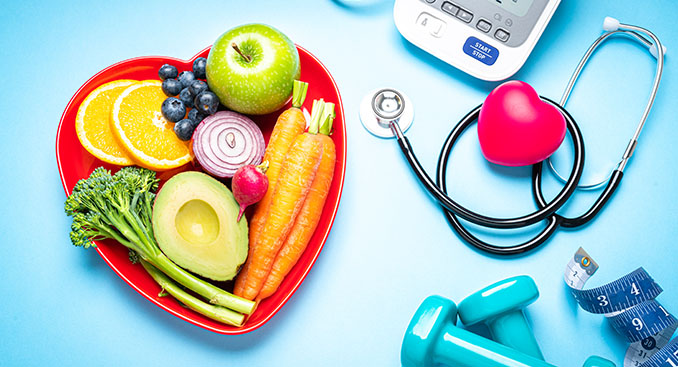- Health & Wellness
- Primary Care
- Service Line
- Women's Health
6 Ways to Love Your Heart

You are probably aware that heart disease is the leading cause of death in the United States, causing about one in four deaths, according to data from the Centers for Disease Control (CDC). But did you know that you can greatly reduce your risk through lifestyle changes and in some cases in partnership with medical care providers? Here are six ways you can show your heart some love:
1. Know the risk factors
“There are many factors that can impact your heart’s health,” says Kamal Shemisa, MD, a cardiologist with the TriHealth Heart & Vascular Institute. “Some factors you can’t control, such as family history and age, but it’s still good to be aware of them, especially when taken into account with other risk factors that you can control.”
According to the CDC, these risk factors include:
- High blood pressure
- High blood cholesterol
- Smoking
- Obesity
- Excessive alcohol use
- Unhealthy diet
- Diabetes
2. Eat a heart-healthy diet
“This is one of the easiest, but most impactful things you can do to limit heart disease,” says Dr. Shemisa. “It can also help limit other risk factors such as obesity, high blood pressure and high cholesterol.”
A heart-healthy diet should include:
- Plenty of fruits and vegetables and fewer processed food
- Fiber-rich whole grains
- Lean-meats that are lower in saturated fat with at least two servings per week of foods such as certain fish that are high in omega-3 fatty acids
- Low-fat dairy products
- Less than 1,500 mg of sodium per day
3. Keep moving
According to Dr. Shemisa, regular exercise can decrease your resting heart rate, boost good cholesterol, and help keep your weight in check.
“Even small changes can be good for your heart,” says Dr. Shemisa. “You should get at least 30 minutes of exercise per day. Simply walking every day is a great, inexpensive and easy way to start.”
4. Get some sleep
“Your heart is your hardest-working muscle,” Dr. Shemisa says, “and just like any other muscle, it requires the appropriate amount of rest to repair itself. A prolonged lack of sleep can lead to numerous serious health problems.”
The CDC recommends that most adults get at least seven hours of sleep each night for good health.
5. Pay attention to warning signs
“Your chances of full recovery from a heart attack increase significantly if you act quickly,” says Dr. Shemisa. “That’s why it’s important to know the signs and take them seriously. If you are somebody nearby experience the symptoms of a heart attack, it’s critical that you call 911 immediately.”
The American Heart Association lists these common signs of a heart attack:
- Pain or discomfort in the chest
- Lightheadedness, nausea or vomiting
- Jaw, neck or back pain
- Discomfort or pain in the arm or shoulder
- Shortness of breath
Dr. Shemisa notes that women are more likely than men to experience the less typical heart attack symptoms of back pain, nausea and fatigue, so it’s important for them to pay attention to those signs.
6. Talk to your doctor
Dr. Shemisa recommends talking to your doctor about your own risk factors and getting to know your own key vitals that could impact your health, including cholesterol, triglycerides, blood pressure, body mass index and others.”
“Everybody’s body is unique, he says. “As are their risk factors and optimal ranges. That’s why you should talk to your doctor about your own numbers and how you can partner with them to monitor them and achieve your personal health goals.”